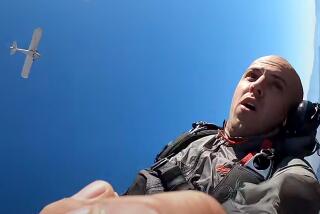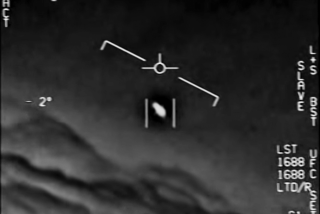‘Both sons treated an airplane like they treated a souped-up car.’
- Share via
Fred E. Jacob, retired, hasn’t got a lot of time to spare, and he isn’t afraid to tell a stranger so.
His business card reads: “No Future; No Address; No Business; No Prospects; No Phone; No Office.”
Actually, that’s a ruse to deflect unwanted intrusions. Jacob, who is 89, still has a few prospects.
“I plan on sticking around till I’m 97,” he said. “I’ve got a lot of things planned. After that, if St. Peter pulls my card, I won’t object too much.”
And he does have a phone. The number is printed on the back of the business card in a code. He will reveal the key to anyone he needs to talk to. That would include Gen. Jimmy Doolittle, who led the famous World War II bombing raid on Tokyo, or, on a lower plane, any member of the club that is his current preoccupation.
It’s called UFO. The letters stand for United Flying Octogenarians. Jacob and a few other old-time pilots started it in 1982. Now, nearly 100 pilots are in, he said.
Gen. Doolittle isn’t among them. He’s stopped flying, Jacob said. But a recent issue of the UFO newsletter shows a snapshot of Jacob and Doolittle, two old friends, out for a walk at the general’s Carmel home.
“Jim and I have been friends since in the ‘20s,” Jacob said.
That’s just one of the many threads of Jacob’s life that appear in hundreds of snapshots and news clippings pinned to the wall of his basement office, behind the garage of the Glendale home he calls his cottage.
Jacob took a few minutes this week to recall some of those events that he wrote down several years ago in a book, “Takeoffs and Touchdowns.”
He traced his lifetime of flying to a specific moment on a day in 1918 when two Army pilots landed in biplanes on his cousin’s Michigan farm.
“I was out there on my bicycle in nothing flat,” he said.
The pilots stayed a couple of weeks while they took a course in map reading.
“They’d go out to fly the planes and I’d make it a point to be out there,” he said. “They’d always let me sit up front.”
It was a decade before Jacob, then a sales manager for a Denver company, could buy his own airplane, a Lincoln-Page that cost $3,150.
A shattered propeller from that plane hangs on the wall beside his office door. It hit a ground hog mound in a field in Greeley, Colo.
“We were barnstorming,” Jacob said.
He thumbed through his book to a flyer advertising rides in the Lincoln-Page.
“We’d have 1,000 of these printed and go to Fort Collins or some city around Colorado. On a Saturday morning, we went over the city sprinkling these, coming down at 100 feet over the roofs. The plane had no mufflers. You could hear it for two miles.”
But, mostly, Jacob used the plane to sell machinery throughout the prairie states until he sold it and moved to California in 1933.
In Glendale, Jacob raised an airplane family.
He taught his 6-year-old daughter, now 62, to fly a Piper Cub.
“Put two cushions under her and it was a stick control,” he said. “I’d let her make takeoffs and landings with it from here to San Bernardino.”
She’s still the best pilot in the family, he said.
“Both sons treated an airplane like they treated a souped-up car,” he said. “They’d yup it around turns just to show that they were in command.”
When World War II started, they enlisted in the Navy.
“I could have got them both second lieutenants in the Air Force,” he said. “But all of Hoover High School here was going Navy.”
Jacob, having 3,000 hours of flying, was made a captain. He flew B-17s and B-24s to Europe and eventually commanded the 310th Ferrying Squadron in England, under Doolittle.
Jacob said he got the job done, but his specialty was finding the best food in England.
“Jim kept noticing,” Jacob said. “He said, ‘How in the heck do you rate all this good food?’ I said, ‘I know where the food is.’ ”
After the war, Jacob continued to fly. He still does, although on a reduced schedule. He has a pacemaker now and will only fly with a young pilot aboard.
“I don’t do over 50 to 100 a year flying any more, partly because of this,” he said, rolling up his pant leg to show a scar down the middle of his knee. “World War II.”
He didn’t want to talk about the injury.
“I got nicked,” he said. “Other people got it worse than I did.”
But he did want to talk about his current project, which is to get President Reagan’s signature on a stack of color photographs. They show Reagan and former Arizona Sen. Barry Goldwater making Doolittle a four-star general in a White House ceremony. Goldwater has signed them.
“Next week, I’ll be back at the White House having the boss autograph a dozen of these,” Jacob said.
Jacob said he was introduced to Reagan in 1966, at the Castaways Restaurant in Burbank, through contacts from past campaigning for his college classmate, former presidential candidate Thomas Dewey.
“If he’d of cut off that damn little Hitler mustache of his, he’d have been president,” Jacob groused.
But that’s another story.
More to Read
Sign up for The Wild
We’ll help you find the best places to hike, bike and run, as well as the perfect silent spots for meditation and yoga.
You may occasionally receive promotional content from the Los Angeles Times.







